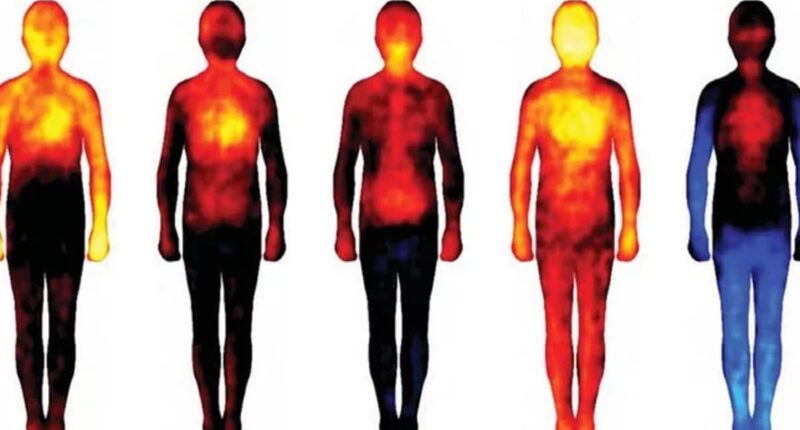This is what warm fuzzy feeling you experience when you’re happy looks like.
A fascinating map shows the human body’s response to 14 different common emotions – from fear to love and shame.
That feeling of utter bliss is shown as a wash of sensation that affects the entire body.
They call it the blues for a reason. Depression causes numbness or a lack of feeling in the limbs and head, showing up as blue on the map.
Fear hits you right in the chest, delivering a sharp sensation as fight or flight kicks into high gear.
Researchers asked participants to paint where they felt stimulated by a certain emotion on a blank silhouette, resulting in these maps being created.
On a second silhouette, they were also asked to paint parts of the body that felt de-stimulated by the emotion.
While everyone’s paintings looked slightly different, averaging the maps together revealed signature patterns for each of the 14 emotions.

A study found that different emotions trigger unique sensations in distinct body parts, indicating that the physical manifestations of emotions have evolved throughout time.
The majority of participants showed that happiness and love were felt across almost the entire body, fear was strongly located in the chest, and anger was mainly felt in the arms and hands.
The researchers published their emotional body charts in the Proceedings of the National Academy of Sciences in 2013.
Recently, they were used in a study to see if the physiological locations of human emotions has changed over time.
Researchers analyzed one million words from ancient Mesopotamian texts to gain insight into how our ancestors felt their emotions.
These texts were written between 934 and 612 BC, and the researchers specifically looked for words that described how people in the ancient Mesopotamian region —located where much of Iraq and Kuwait are today — felt emotions in their bodies.
Many emotions aligned with modern perceptions, but some were starkly different.
For example, ancient Mesopotamians linked happiness to the liver and anger to the feet, which contrasts with modern experiences in the chest and hands.
‘If you compare the ancient Mesopotamian bodily map of happiness with modern bodily maps, it is largely similar, with the exception of a notable glow in the liver,’ study co-author and cognitive neuroscientist Juha Lahnakoski said in a statement.

Research has shown research that modern humans experience anger in their upper body and hands, whereas ancient humans felt ‘heated’, ‘enraged’ or ‘angry’ in their feet

To compare the emotional experiences of modern humans with our ancestors’, a multidisciplinary team of researchers poured over one million words of the ancient Akkadian language written on cuneiform scripts and clay tablets
Similarly, research has shown that modern humans experience anger in their upper body and hands, whereas ancient humans felt ‘heated’, ‘enraged’ or ‘angry’ in their feet.
Even the way humans feel love has changed slightly.
The modern physical sensation is mostly the same as the ancient Mesopotamians’, but for our ancestors, this feeling was particularly associated with the liver, heart and knees.
Today, modern humans report that love triggers a full-body sensation.
The researchers published their study in the journal iScience in December.
These findings suggest that the way people feel emotions has changed over time.
But ‘It remains to be seen whether we can say something in the future about what kind of emotional experiences are typical for humans in general and whether, for example, fear has always been felt in the same parts of the body,’ said lead author Saana Svärd, who studies ancient Mesopotamia at the University of Helsinki.
‘Also, we have to keep in mind that texts are texts and emotions are lived and experienced,’ Svärd said.
The researchers stressed that it is important to keep this distinction in mind when comparing ancient texts to modern body maps, which were based on self-reported bodily experience as opposed to linguistic descriptions alone.

















